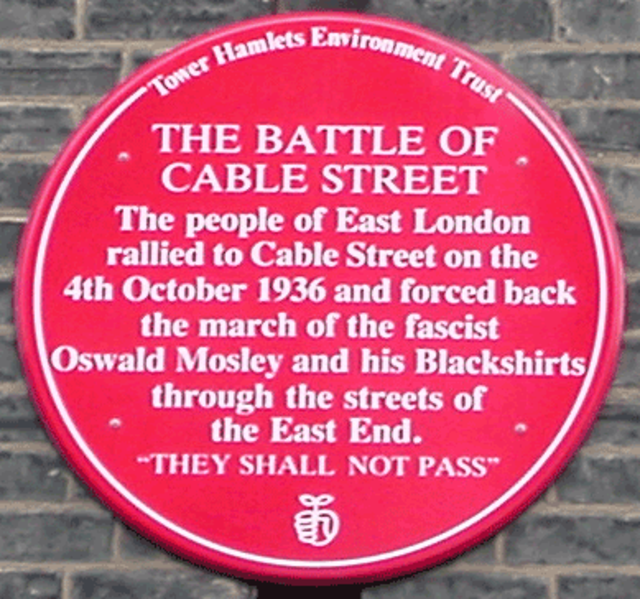The early 1930s were a time of crisis and a growing Fascist threat. In 1922, Mussolini became the Italian leader. 11 years later, President von Hindenburg appointed Hitler as the German Chancellor. In 1936, General Franco staged a coup in Spain. In 1932, Sir Oswald Mosley formed the British Union of Fascists (BUF or Blackshirts). The BUF had their own paramilitary fighting force, which terrorised Jewish communities, bombing houses and carrying out indiscriminate racist attacks.
In 1934, the Daily Mail, a major mainstream daily newspaper, ran a headline “Hurrah for the Blackshirts.” Mosley was interviewed in The Tatler. In the same week that Franco was appointed head of Spain’s coup government, Mosley announced that the BUF would march through East London, home to half the Jewish population of Britain. After initially hesitating, the Independent Labour Party (ILP), then the Communist Party (CP), called for barricades to defend the area. The Labour Party and the Jewish Board of Deputies told their members to stay away.
Local activists, led by the local ILP and CP branches and Jewish groups, mobilised 100,000 people behind the slogan “They shall not pass”—the same slogan that was being used by anti-fascists in besieged Madrid. Tram drivers used their vehicles to block the intended route of the BUF march. This mass mobilisation prevented 3,000 Blackshirts from marching through the East End, although the fascists were supported by approximately 10,000 police including the entire Metropolitan Police Mounted Division.
As the newspaper The Guardian reported at the time: “In Cable Street a crowd seized materials from a builder’s yard and began to construct a barricade. They used corrugated iron, barrels, coal, and glass to construct a barrier, even pulling up paving-stones. When the police intervened they were greeted with a shower of stones.” They did not pass.
Local Communist activist Phil Piratin reported the effect: “Nothing had changed physically. The poor houses, the mean streets, the ill-conditioned workshops were the same, but the people were changed. Their heads seemed to be held higher, and their shoulders were squarer—and the stories they told! Each one was a ‘hero’—many of them were… The people knew that fascism could be defeated if they organised themselves to do so.” As fascists mobilise in Europe once more, we must learn the lessons of Cable Street.




